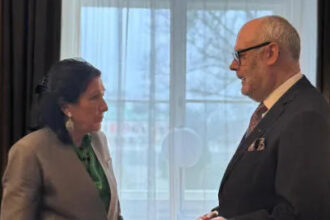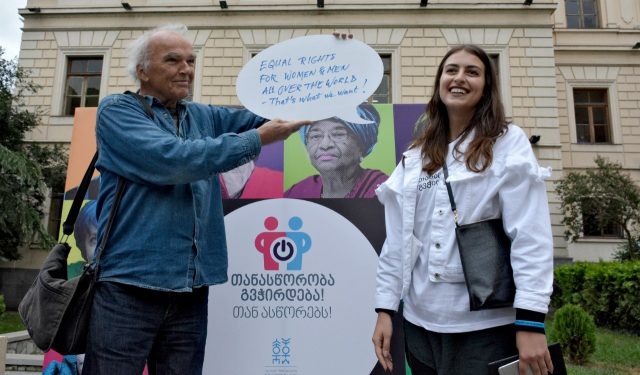With the help of UNDP and other partners, Georgia’s parliament assesses the impact of legislation on gender equality.
Georgia is known for its rugby players, weightlifters and other athletes. But in reality, more than 80 percent of Georgians do not exercise at all. Women are particularly affected: only one out of ten participates in regular physical activity. Other countries’ experience shows that this isn’t a personal choice, but rather an indication of unequal and insufficient access to sports facilities and training. Georgia’s parliament has conducted a Gender Impact Assessment of the Draft Law on Physical Education and Sport to help remedy these deficiencies and inequalities. This was done with the assistance of the United Nations Development Programme, the National Democratic Institute, the UK aid provided by the British people, and USAID’s Good Governance Initiative.
Mikheil Kavelashvili is the Chair of the Parliamentary Sports and Youth Issues Committee. He stressed that sports and healthy lifestyles should be accessible to all people, regardless of their gender, age, ability, or income. “By analyzing Georgia’s legislation in this area, we identified the major challenges and obstacles that stop girls and women from participating in sport activities. We outlined specific recommendations to government institutions and other players to counter gender-based inequalities in sport.”
The GIA, which was presented today by Parliamentary Committee on Sport and Youth Issues confirmed gender gaps regarding access to sports education and infrastructure. This included a lack of qualified teachers and trainers in schools and universities, as well as unequal representation between men and women within sport governance. It noted that widespread gender stereotypes discourage women from taking part in sports, resulting in them missing out on an essential ingredient for a healthy lifestyle. The report concluded that all people of all ages should have access to sports infrastructure and that all primary, secondary and university education programmes should include gender-sensitive sport education.
The assessment echoes findings of a recent parliamentary inquiry on expanding sport and physical activity in Georgia. This was supported by the European Union, UNDP and the Westminster Foundation for Democracy. The inquiry concluded that providing women and girls with appropriate facilities and combating stereotypes are key to encouraging them to become more active.
Louisa Vinton, UNDP’s Director, said that it was encouraging to see Georgian policy-makers taking such a serious approach to how policies can impact men and women differently. “Their analysis is going to help make Georgian laws more gender-sensitive, and provide practical measures that will ensure that girls and woman have equal opportunities to experience the thrills of sports and benefits of regular physical exercise.”
The draft Law on Physical Education and Sport was the seventh piece to be subjected to a gender impact assessment by the parliamentary committee. The other pieces of legislation are: the Drug Policy Reform, the Draft Law on Occupational Safety, the Law on Violence against Women and the Elimination of Domestic Violence, the Amendments to the Criminal Code on Domestic Violence and Gender-Based Crimes and the Law on Taxation of Small Enterprises. In 2019, the same method was used to review governmental regulations when reviewing Amendments to the Law on Motor Transport.
Gender impact assessments were first implemented in Georgia with support from UNDP and NDI. The UK Aid from the British people, as well as USAID’s GGI, also supported this initiative. The UN Joint Programme for Gender Equality is funding the GIA for Georgian legislation. This initiative supports the political and economical empowerment of Georgian Women and promotes gender equity in all spheres.
Image: Vladimer Valishvili/UNDP
Read More @ georgiatoday.ge




